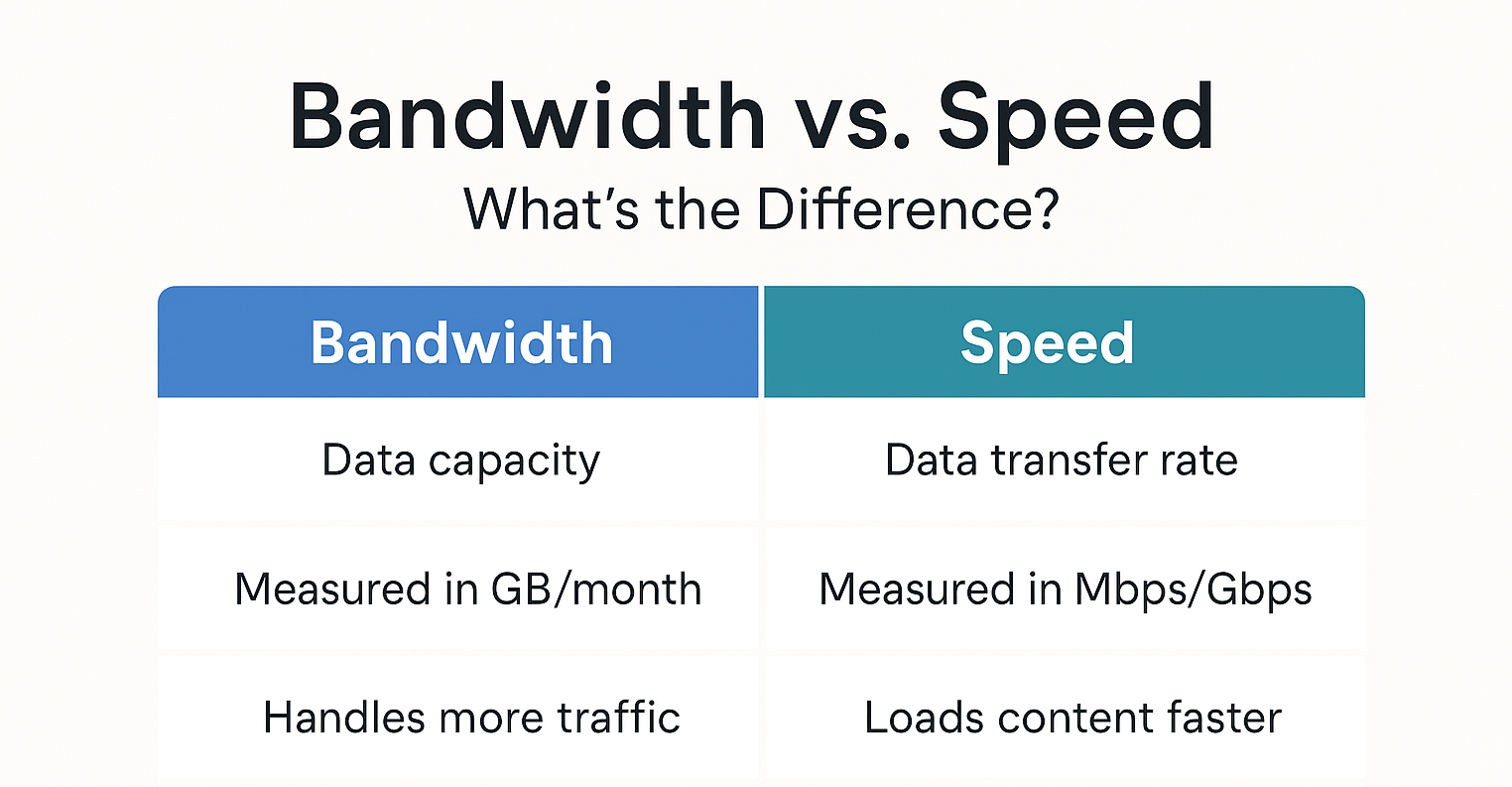Limited Offer. One-Time Deal.
3 years Hosting + 2 Years Free
Everything you need to launch online.
Learn everything about bandwidth in web hosting, discover how it affects site performance, traffic handling, and SEO. Optimize your website with Thamara’s unlimited bandwidth and performance-focused hosting solutions.

What do website owners want most? The answer is usually more traffic. But as websites grow in popularity, they often face a hidden problem: bandwidth limitations. Ironically, success can lead to performance issues. Small websites struggle to get enough visitors, while growing websites suffer from excessive bandwidth usage due to higher traffic and increasingly complex content. So, what is bandwidth in web hosting, and why should it matter to you? That we will discuss in this article, let’s break it down
Bandwidth in web hosting refers to the amount of data your website can transfer to users over a specific period, usually measured monthly in gigabytes (GB). It’s the digital “capacity” that allows your website to serve pages, images, videos, and other files to visitors when they access your site.
Every time someone visits your website, data is transferred from your server to their browser, whether it’s a small file like text or a larger file like an image or video. For example, if a visitor downloads a 10 KB image, that’s 10 KB of bandwidth used. The total data transfer over time is referred to as bandwidth usage.
Think of bandwidth as it works like a highway:
That brings us to an important point: why is bandwidth such a big deal?
Content is delivered to users faster when your website has enough bandwidth, especially during peak traffic times. The more bandwidth you have, the smoother and more reliable your site will perform.
Websites with higher bandwidth capacity can support rich content like videos, high-resolution images, animations, and interactive features without slowing down. This creates a better user experience and builds trust in your brand.
Having unlimited bandwidth, which we’ll cover later, ensures your site stays responsive during traffic spikes, like promotions or seasonal sales. It’s essential for e-commerce stores with media-heavy content
Want to handle peak traffic without slowdowns? Choose Thamara’s performance-optimized web hosting
Still, many people confuse bandwidth with another performance factor: speed. Let’s clear that up.

The terms “bandwidth” and “speed” are often confused with each other, but they’re not the same. This mix-up is common, especially in ads by internet providers that mention “faster speeds” when they’re referring to bandwidth.
✅ In short:
Both are important, but for different reasons. If you need to know more about the difference, check Cisco
Now that we understand what bandwidth is and why it matters, let’s talk about a common marketing term, “unlimited bandwidth.” Is it unlimited?
Many web hosting providers advertise “unlimited” or “unmetered” bandwidth, which sounds like you can use as much data as you want, but that’s not entirely accurate. In reality, unmetered bandwidth simply means you won’t be billed based on how much bandwidth your site uses, and there’s no fixed monthly cap. It gives your website the flexibility to grow and handle spikes in traffic without additional charges. However, that doesn’t mean the resources are limitless. If your website starts consuming excessive server power, whether through high CPU usage, heavy RAM consumption, or frequent disk operations, it can impact other sites on the same shared server. That’s why providers enforce fair usage policies and monitor performance. So, while you don’t have to worry about bandwidth limits in the traditional sense, you do need to keep your site optimized to avoid resource overuse or potential restrictions.
So, if bandwidth isn’t truly limitless, how can you manage it smartly? Start by understanding what affects it
Several key elements directly influence your website’s bandwidth consumption. Understanding them helps you choose the right web hosting plan and manage your site’s performance efficiently.
1- Website Traffic: The number of visitors directly affects your bandwidth usage; the more traffic your site receives, the more data is transferred between your server and users. During peak times or viral campaigns, this can lead to significantly higher bandwidth consumption.
2- Content Type: Rich media like videos, images, and animations consume far more bandwidth than plain text.
3- Page Size: The overall size of your web pages, especially those with high-resolution images, embedded videos, or rich media, has a major impact on bandwidth usage. Larger files mean more data must be transferred with each visit, increasing your total bandwidth consumption.
4- User Activity: Downloads, video streaming, or frequent interaction increase bandwidth usage
5- Website Structure & Design: The complexity of your website’s layout, including dynamic content, animations, and the use of multiple plugins or third-party tools, can significantly increase bandwidth consumption. Heavily designed sites with unoptimized code or bloated themes often require more data to load, especially on each user interaction.
6- CMS & Technologies Used: The content management system (CMS) and server-side technologies you use can influence bandwidth consumption. Some platforms and frameworks require more resources to load and operate, leading to increased data transfer between your server and visitors.
7- CDNs & Caching: Using caching techniques and Content Delivery Networks (CDNs) helps reduce bandwidth usage by storing and delivering content from servers that are geographically closer to your users. This minimizes the amount of data pulled directly from your main server, improving load times and lowering data transfer.
8- Frequent Updates: E-commerce sites or news platforms with constantly changing content typically consume more bandwidth over time
If these factors are not well managed, your website may run into serious issues. Let’s look at some of the most common problems caused by limited bandwidth.
Despite what many believe, unlocking the full potential of your web hosting account takes more than just signing up for a good plan; it requires awareness and proper resource management. In shared hosting environments, especially, poor optimization or excessive usage can degrade performance for everyone on the server. Once your website exceeds the allocated bandwidth, several negative effects can occur:
1. Slow Website Performance: Excessive bandwidth usage slows down your site. Page load speed is vital for both user experience and SEO rankings; a slow site means fewer visitors, lower traffic, and lost revenue.
2. Traffic Spikes Can Crash Your Site: Unexpected surges in visitors during marketing campaigns or viral moments can overwhelm limited bandwidth, causing downtime or errors. In shared hosting, another site’s spike may affect your own.
3. Large Pages Use More Bandwidth: Heavy web pages, especially those with uncompressed images, large scripts, or poor HTML, transfer more data per visit, eating through your bandwidth quicker than expected
4- Delayed or Blocked Email Delivery: High bandwidth use can slow down your email performance, especially if spam or malware causes mass email sending, consuming server resources without your knowledge.
Pro Tip:
Track your monthly usage by monitor and optimizing . If you’re consistently hitting 80% of your bandwidth, consider scaling up to a higher plan to ensure stable performance and uninterrupted growth.
Managing your website’s bandwidth efficiently is key to maintaining performance and avoiding overage issues. Here’s how you can check, monitor, and optimize bandwidth use effectively:
1. Most web hosting providers offer tools in the dashboard (like Plesk or cPanel) to track how much bandwidth your site is consuming. With Thamara’s Plesk Panel, you can easily access real-time stats and usage history to spot any unusual spikes
2. Use website analytics like Google Analytics or similar tools to help identify which pages or media files are consuming the most bandwidth based on user behavior and traffic sources.
3. Reduce page sizes by compressing images, using modern formats (like WebP), and minimizing code (HTML, CSS, JS). Lightweight pages consume less bandwidth per visit.
4. Caching stores frequently accessed content locally on users’ browsers, while CDNs (Content Delivery Networks) serve content from nearby servers, reducing data transfer from your origin server.
5. Avoid heavy auto-play videos or large scripts loading on every page. Let users choose to play content when needed.
6. Regularly Clean and Update Your Website. Remove outdated plugins, unused media, and unnecessary files.
Choosing the right hosting provider isn’t just about speed and space; it’s about trust and flexibility. That’s where Thamara’s unlimited bandwidth policy makes a real difference.
With Thamara, your website isn’t limited by rigid data caps. Instead of charging you based on how much traffic your site receives or how much data is transferred, we offer unlimited bandwidth, meaning your website can grow, attract more visitors, and handle spikes in traffic without surprise charges.
It means we won’t restrict your data usage as long as your website operates within reasonable limits and doesn’t negatively affect other users on the shared server. Our servers are monitored for fair usage, ensuring that performance stays smooth for everyone.
So whether you’re launching a new blog, running a small business site, or scaling your e-commerce store
Ready to scale without bandwidth worries? Start web hosting smarter with Thamara hosting

3 years Hosting + 2 Years Free
Everything you need to launch online.